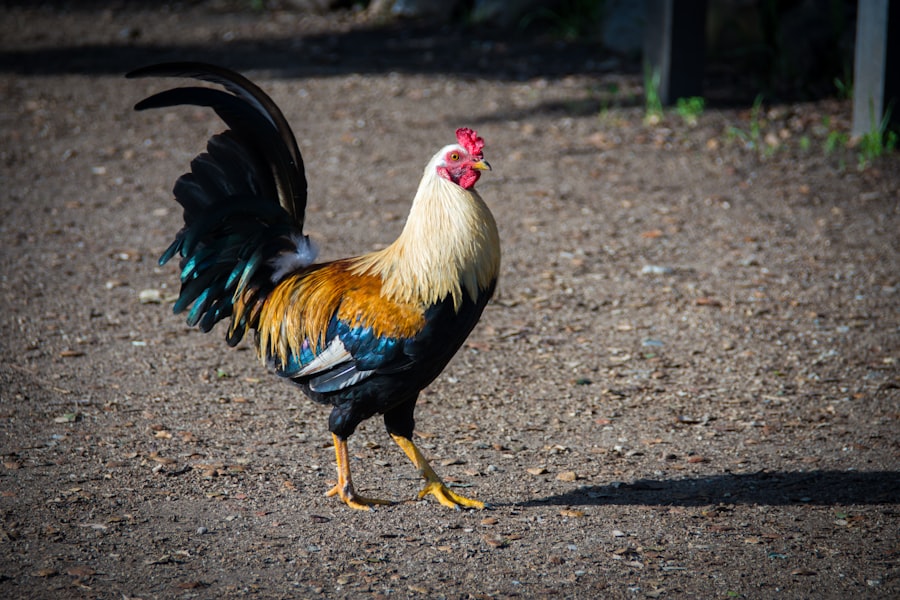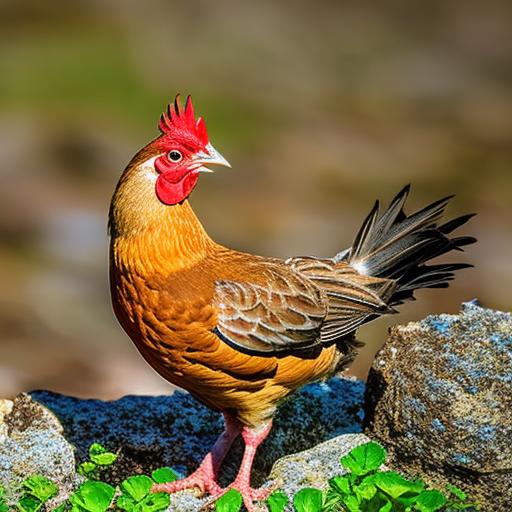Keeping chickens in your backyard has become a popular trend in recent years. Not only do they provide fresh eggs, but they also offer natural pest control and fertilizer for your garden. However, before you jump into the world of backyard chickens, it’s important to familiarize yourself with the bylaws and regulations in your area. Bylaws are put in place to ensure the safety and well-being of both the chickens and the community. In this article, we will explore the importance of following these bylaws, the benefits of keeping chickens, the types of chicken coops allowed, guidelines for building a coop, chicken feed and nutrition, health and safety measures, noise and odor control, obtaining permits and licenses, as well as potential penalties for violating bylaws.
Key Takeaways
- Bylaws on keeping chickens and chicken coops are important regulations that must be followed.
- Keeping chickens in your backyard can provide numerous benefits, including fresh eggs and natural pest control.
- Bylaws typically allow for various types of chicken coops, including stationary and mobile options.
- Building a chicken coop requires following specific requirements and guidelines, such as ensuring proper ventilation and predator protection.
- Health and safety measures, as well as noise and odor control, must be taken into consideration when keeping chickens in residential areas.
Understanding the Importance of Bylaws on Keeping Chickens
Following bylaws when keeping chickens is crucial for several reasons. Firstly, it is important to comply with local regulations to avoid legal issues. Many cities and towns have specific rules regarding the number of chickens allowed, coop size and location, noise restrictions, and waste management. Violating these bylaws can result in fines or even having to remove your chickens from your property.
Secondly, bylaws are in place to ensure the safety of both the chickens and the community. Properly constructed chicken coops can protect your flock from predators and harsh weather conditions. Additionally, following guidelines for coop size and location can prevent overcrowding and potential health issues for the chickens. By complying with these regulations, you are ensuring that your chickens have a safe and healthy environment to thrive in.
Benefits of Keeping Chickens in Your Backyard
Keeping chickens in your backyard offers numerous benefits. One of the most obvious advantages is having a constant supply of fresh eggs. There is nothing quite like collecting eggs from your own flock each morning. Not only are these eggs delicious, but they are also more nutritious than store-bought eggs. Backyard chickens have access to a varied diet, including insects and plants, which results in eggs that are higher in omega-3 fatty acids and vitamins.
Another benefit of keeping chickens is natural pest control. Chickens love to forage and eat insects, making them excellent at controlling pests in your yard and garden. They will happily devour slugs, snails, and even small rodents. This can significantly reduce the need for chemical pesticides and keep your garden healthy and thriving.
Furthermore, chickens produce high-quality fertilizer for your garden. Their manure is rich in nitrogen, phosphorus, and potassium, which are essential nutrients for plant growth. By composting chicken manure and using it in your garden, you can improve soil fertility and promote healthy plant growth.
Types of Chicken Coops Allowed by Bylaws
Bylaws typically outline the types of chicken coops that are allowed in residential areas. These regulations may include specifications on coop size, location, and appearance. The size of the coop will depend on the number of chickens you plan to keep. It is important to provide enough space for each chicken to move around comfortably and engage in natural behaviors.
The location of the coop is also an important consideration. Bylaws may require a certain distance between the coop and neighboring properties or structures. This is to ensure that the coop does not cause any disturbances or nuisances to nearby residents. Additionally, bylaws may specify that the coop should be located away from property lines or public areas.
The appearance of the coop is another aspect that may be regulated by bylaws. Some areas may have restrictions on the materials used for construction or require that the coop blends in with the surrounding environment. It is important to review your local bylaws to ensure that your chicken coop meets all the necessary requirements.
Building a Chicken Coop: Requirements and Guidelines
When building a chicken coop, it is important to follow the requirements and guidelines outlined in the bylaws. These guidelines are in place to ensure the safety and well-being of the chickens, as well as to minimize any potential disturbances to the community.
Firstly, the materials used for construction should be sturdy and predator-proof. Chicken coops should be built with solid walls and a secure roof to protect the chickens from predators such as raccoons, foxes, and rats. Additionally, the coop should have proper ventilation to prevent moisture buildup and ensure good air circulation.
Secondly, the coop should have adequate space for the number of chickens you plan to keep. Each chicken should have at least 4 square feet of indoor space and 10 square feet of outdoor space. This allows them to move around comfortably and engage in natural behaviors such as scratching and dust bathing.
Furthermore, the coop should have nesting boxes for the hens to lay their eggs. These boxes should be filled with clean bedding material such as straw or wood shavings. It is important to regularly clean and replace the bedding to maintain a clean and hygienic environment for the chickens.
Lastly, the coop should have a secure fencing system to prevent the chickens from wandering off into neighboring properties or public areas. This will also help protect them from predators and keep them safe within their designated area.
Chicken Feed and Nutrition: What You Need to Know

Proper nutrition is essential for keeping your chickens healthy and productive. Chickens require a balanced diet that includes a combination of grains, protein, vitamins, and minerals. There are several types of chicken feed available on the market, including pellets, crumbles, and mash.
Pellets are a popular choice as they provide a complete and balanced diet for chickens. They contain all the necessary nutrients in a compact form, making it easy for chickens to consume. Crumbles are similar to pellets but are broken down into smaller pieces, making them suitable for younger chickens or those with smaller beaks. Mash is a finely ground feed that can be mixed with water to create a porridge-like consistency. This is often used for chicks or older chickens that have difficulty eating solid feed.
In addition to their regular feed, chickens also require access to fresh water at all times. Water is essential for digestion, egg production, and overall health. It is important to provide clean water in a container that is large enough for all the chickens to drink from comfortably.
Chickens also enjoy treats such as fruits, vegetables, and grains. These treats should be given in moderation and should not exceed 10% of their total diet. Treats can be used as a way to supplement their diet and provide additional nutrients. However, it is important to avoid giving them foods that are toxic to chickens, such as chocolate, avocado, onions, and caffeine.
Health and Safety Measures for Keeping Chickens
Keeping your chickens healthy and safe is essential for their well-being and productivity. Regular cleaning of the coop is important to prevent the buildup of waste and bacteria. The coop should be cleaned at least once a week, with soiled bedding removed and replaced with fresh bedding. This will help maintain a clean and hygienic environment for the chickens.
Pest control is another important aspect of chicken care. Regularly inspect the coop for signs of pests such as mites, lice, or rodents. These pests can cause stress and health issues for the chickens. There are several methods of pest control available, including natural remedies such as diatomaceous earth or essential oils, as well as commercial products specifically designed for poultry.
Disease prevention is also crucial when keeping chickens. It is important to practice good biosecurity measures to minimize the risk of disease transmission. This includes limiting contact with other poultry, disinfecting equipment and footwear before entering the coop, and quarantining new chickens before introducing them to the flock. Regular health checks and vaccinations can also help prevent the spread of diseases.
Noise and Odor Control: Addressing Concerns and Complaints
One common concern when it comes to keeping chickens is noise and odor. Roosters are known for their crowing, which can be disruptive to neighbors, especially in urban areas. If you live in an area where roosters are not allowed, it is important to ensure that you only keep hens.
To minimize noise, it is important to provide a well-insulated coop that can muffle the sound of crowing. Additionally, keeping the coop clean and well-maintained can help reduce odor. Regularly cleaning the coop and removing waste will prevent the buildup of ammonia and other odors.
It is also important to be considerate of your neighbors when it comes to noise and odor. Communicate with them about your plans to keep chickens and address any concerns they may have. By being a responsible chicken owner and taking steps to minimize noise and odor, you can maintain a positive relationship with your neighbors.
Obtaining Permits and Licenses for Keeping Chickens
Before starting your backyard flock, it is important to check if you need any permits or licenses to keep chickens in your area. Some cities or towns may require a permit or license for keeping chickens, while others may have specific regulations that need to be followed.
To obtain a permit or license, you may need to fill out an application form and pay a fee. The application may require information such as the number of chickens you plan to keep, the size of your coop, and the location of your property. It is important to provide accurate information and comply with all the requirements outlined in the application.
Additionally, some areas may have restrictions on the number of chickens allowed or specific zoning requirements for keeping chickens. It is important to review the bylaws and regulations in your area to ensure that you are in compliance with all the necessary requirements.
Penalties and Fines for Violating Bylaws on Keeping Chickens and Chicken Coop
Violating bylaws on keeping chickens and chicken coops can result in penalties and fines. The specific penalties will vary depending on the regulations in your area. In some cases, you may be given a warning and asked to rectify the issue within a certain timeframe. Failure to comply with the bylaws may result in fines or even legal action.
To avoid penalties and fines, it is important to familiarize yourself with the bylaws and regulations in your area before starting your backyard flock. Ensure that you meet all the necessary requirements for keeping chickens and building a chicken coop. By following the guidelines and complying with the bylaws, you can enjoy the benefits of keeping chickens without any legal issues.
In conclusion, keeping chickens in your backyard can be a rewarding experience. Not only do they provide fresh eggs, natural pest control, and fertilizer for your garden, but they also offer a unique connection to nature. However, it is important to follow the bylaws and regulations in your area to ensure the safety and well-being of both the chickens and the community.
Bylaws are put in place to regulate the number of chickens allowed, coop size and location, noise restrictions, waste management, and other important factors. It is crucial to comply with these regulations to avoid legal issues and maintain a positive relationship with your neighbors.
When building a chicken coop, it is important to follow the guidelines outlined in the bylaws. This includes using sturdy materials, providing adequate space for the chickens, ensuring proper ventilation, and predator-proofing the coop.
Proper nutrition, health, and safety measures are also essential for keeping chickens. Providing a balanced diet, clean water, regular cleaning of the coop, pest control, disease prevention, and addressing noise and odor concerns are all important aspects of chicken care.
Obtaining permits and licenses, if required in your area, is also an important step before starting your backyard flock. By familiarizing yourself with the bylaws and regulations, you can ensure that you are in compliance with all the necessary requirements.
Violating bylaws on keeping chickens and chicken coops can result in penalties and fines. It is important to avoid these consequences by following the guidelines and complying with the bylaws.
In conclusion, keeping chickens in your backyard can be a rewarding and fulfilling experience. By following the bylaws and regulations, you can enjoy the benefits of fresh eggs, natural pest control, and fertilizer for your garden while maintaining a positive relationship with your community. So go ahead, start your own backyard flock and enjoy the many joys that come with it!
If you’re interested in learning more about bylaws on keeping chickens, you may also find the article on “What Vegetables Do Quails Eat?” from Poultry Wizard informative. Understanding the dietary needs of quails can be helpful when considering backyard poultry options. Additionally, Poultry Wizard offers insights into various aspects of poultry care, such as the mating season for turkeys and even a unique service called “Rent a Chicken Coop.” Explore these articles and expand your knowledge on poultry keeping. (source)
FAQs
What are bylaws on keeping chickens?
Bylaws on keeping chickens are rules and regulations set by local governments that dictate how many chickens a person can keep, where they can be kept, and how they should be cared for.
Why do cities have bylaws on keeping chickens?
Cities have bylaws on keeping chickens to ensure that the birds are kept in a safe and healthy environment, and to prevent any negative impact on the surrounding community.
What are some common bylaws on keeping chickens?
Common bylaws on keeping chickens include restrictions on the number of chickens allowed, requirements for coop size and placement, and regulations on noise and odor.
Can anyone keep chickens?
No, not everyone can keep chickens. Some cities have zoning restrictions that prohibit the keeping of chickens in certain areas, and some homeowners associations may also have rules against keeping chickens.
What are the benefits of keeping chickens?
Keeping chickens can provide a source of fresh eggs, help control pests in the yard, and provide fertilizer for gardens. Additionally, many people find that keeping chickens is a rewarding and enjoyable hobby.
What are some things to consider before keeping chickens?
Before keeping chickens, it is important to consider the amount of space available, the time and effort required to care for the birds, and any potential impact on neighbors or the surrounding community. It is also important to research local bylaws and regulations.
Meet Walter, the feathered-friend fanatic of Florida! Nestled in the sunshine state, Walter struts through life with his feathered companions, clucking his way to happiness. With a coop that’s fancier than a five-star hotel, he’s the Don Juan of the chicken world. When he’s not teaching his hens to do the cha-cha, you’ll find him in a heated debate with his prized rooster, Sir Clucks-a-Lot. Walter’s poultry passion is no yolk; he’s the sunny-side-up guy you never knew you needed in your flock of friends!







